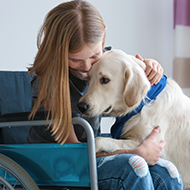Dog Assistance in Disability achieves re-accreditation

Dog A.I.D provides assistance dog training to people over 15 years old with physical disabilities.
Assistance dog charity, Dog Assistance in Disability (Dog A.I.D) has achieved re-accreditation by Assistance Dogs International (ADI) for maintaining high standards of excellence in all areas of assistance dog acquisition, training and partnership.
A review conducted by a trained ADI assessor over two to four days found that the charity, which relies solely on voluntary income, met ADI's Standards of Practice. It means that Dog A.I.D will remain a member programme of the ADI - the leading authority in the dog assistance industry - for a further five years.
Dog A.I.D. chair Sandra Fraser comments: “We are delighted to receive re-accreditation for a further five years from ADI. We have been evaluated on program management, administration, facilities and community activities with gold seal achievement. Full credit goes to our staff, volunteers, clients and dogs for maintaining the highest of standards and dedication to make this possible”.
Based in Shropshire, Dog A.I.D provides assistance dog training to people over 15 years old with physical disabilities up to Assistance Dog standard where suitable. Where Dog A.I.D. differs from most assistance dog charities, is that the dogs they work with belong to the clients.
The organisation operates throughout the UK and currently has 117 fully qualified assistance dogs, with a further 121 in training. Once trained, the new assistance dogs provide vital, life-changing support to their owners, from emptying the washing machine and finding the telephone, to turning on the lights.
ADI is a worldwide coalition of non-profit organisations that raise, train and place assistance dogs. There are currently 133 ADI accredited service dog programmes throughout the world.



 The Veterinary Medicines Directorate (VMD) is inviting applications from veterinary students to attend a one-week extramural studies (EMS) placement in July 2026.
The Veterinary Medicines Directorate (VMD) is inviting applications from veterinary students to attend a one-week extramural studies (EMS) placement in July 2026.